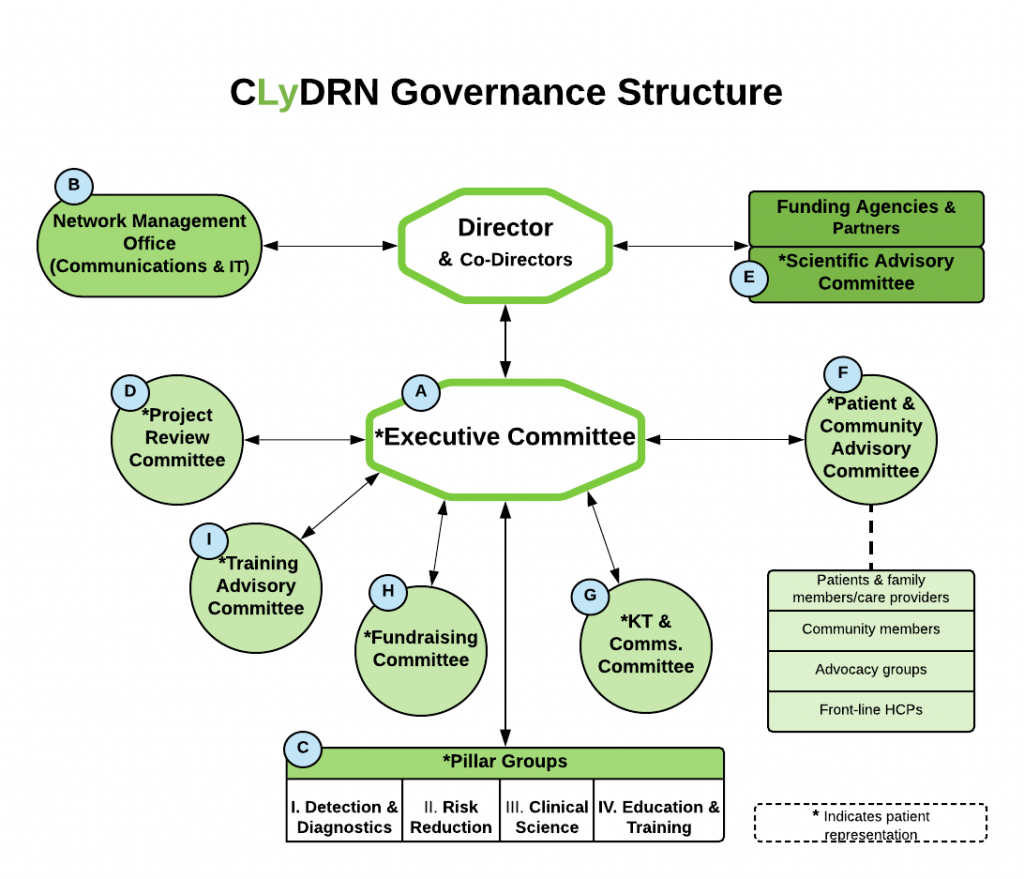EXECUTIVE COMMITTEE: The CLyDRN will be overseen by the Executive Committee (EC) which will provide leadership, support and administrative and financial oversight of the development and ongoing operations of the network, including decisions regarding the overall scientific direction, allocation of funds, revisions to annual operating plans, new partnerships, and provide final approval of all projects and programmatic changes to the Network.
NETWORK MANAGEMENT OFFICE: The Network Management Office (NMO) is the information hub for the Network and will develop project management strategies to support the vision and administrative requirements of the Network and its infrastructures. The NMO will include an information technology (IT) and platform support group with responsibility for IT management and Communications.
PILLAR GROUP COMMITTEE: The primary purpose of the Pillar Group Committee (PGC) is to ensure ongoing review of the Pillar Group research missions, ensure communication and progress towards shared goals between pillars, act as a liaison for Network members working within the research area and develop pillar-specific reporting metrics. Sub-committees for each working group will report/feed forward to the PGC.
PROJECT REVIEW COMMITTEE: The purpose of the Project Review Committee (PRC) is to review applications regarding access to biobank samples and the associated patient cohort data as well as provide scientific peer-review and decision-making for applications to internal Seed Grants and ensure proposals are consistent with the mandate and objectives of the Network.
SCIENTIFIC ADVISORY COMMITTEE: The Scientific Advisory Committee (SAC) serves as an advisory body for the EC and will include international advisors. This diverse group will prioritize and guide the research undertaken by the CLyDRN to ensure relevance and accountability to stakeholders. The SAC will review the Network’s annual progress report to provide an independent and objective evaluation of scientific and strategic priorities and offer guidance to the EC.
PATIENT AND COMMUNITY ADVISORY COMMITTEE: The Patient and Community Advisory Committee (PCAC) provides an opportunity to link researchers with an engaged group of patients and caregivers who have lived experience or provided care for those living with chronic Lyme disease, as well as citizens from communities concerned about Lyme disease. Building on a deliberative dialogue approach, the PCAC will aid CLyDRN to uncover unique understandings of Lyme-related issues and inspire integrated patient-centered solutions. Working groups of patients/loved ones, community representatives, disease advocates and healthcare providers will report to/feed forward to the PCAC.
TRAINING ADVISORY COMMITTEE: The purpose of the Training Advisory Committee (TAC) is to review new trainee applications to join the CLyDRN, provide advice and content for a training curriculum and develop evaluation processes to assess learning and mentoring outcomes. The TAC will be multi-disciplinary and include advisors from ED’s, pediatrics, cardiology, neurology, dermatology, rheumatology and other specialties. This Committee will review curricula development for undergraduate, graduate, medical and post-doctoral education with emphasis on research, KT activities and professional skills related to Lyme disease and support early investigator training. The TAC will partner with the Royal College of Physicians and Surgeons of Canada and the College of Family Physicians of Canada to develop problem-based learning material in support of continuing professional development.
FUNDRAISING COMMITTEE: The purpose of the Fundraising Committee (FRC) is to develop funding strategies and partnerships to ensure the sustainability of the network beyond the period funded by this proposal, and to leverage the expertise and resources of the network to pursue additional granting opportunities and financial support from donor organizations, companies and individuals.
KNOWLEDGE TRANSLATION AND COMMUNICATIONS COMMITTEE: The purpose of the Knowledge Translation and Communications Committee (KTCC) is three-fold: 1) to evaluate the current gaps and divergent perspectives in LD knowledge, attitudes and practices (KAP) in three groups of stakeholders: the general population, LD patients and health care providers; 2) to develop and evaluate LD training and KT tools to enhance globally LD primary, secondary and tertiary prevention, and 3) to develop specific tools designed to enable respectful recognition and interaction of diverse stakeholder perspectives regarding LD management in Canada.




